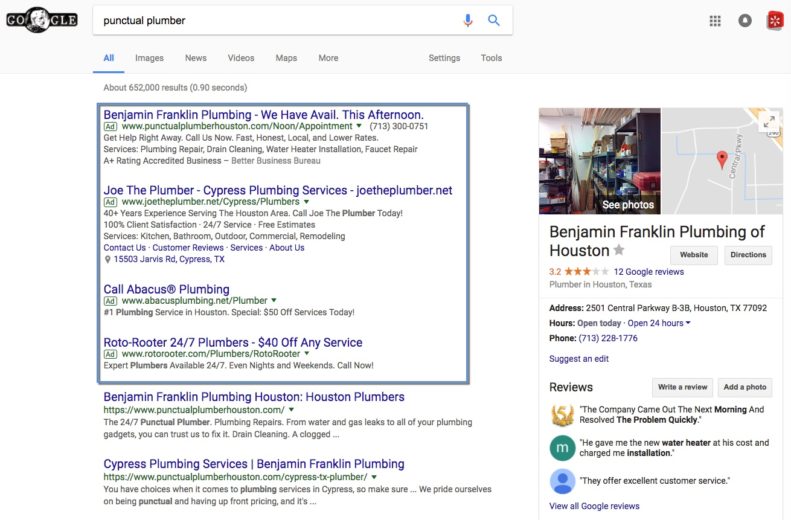On occasions, clients ask if it is worth bidding on Brand when they show up in the #1 spot in Organic search. It is a great question, after all, it could potentially save money and allow for more budget to go to generic campaigns instead. My response, without hesitation, is yes. In fact, you should be bidding on your brand name in all engines for several reasons.
We will discuss several reasons why you should consistently bid on your brand name, including; protecting your name, organic and paid incremental lift, competitors, and controlling the message. If you are not bidding for your own company name, someone else may decide to take advantage of that opportunity. Plus, several studies show brand awareness and even CTRs improve when paid ads are present in the search engine results (SERPs).
Protect Your Brand
There are several reasons to bid on your own brand name. The first reason, it is usually inexpensive to bid on your own company name. Usually, it is the most relevant terms, resulting in high CTRs that lead to high quality scores, and often the cheapest CPCs.
In one account, the total Brand spend makes up 9% of the total monthly budget and the Brand campaign accounts for 59% of their total conversions. This client also has competitors appearing for their brand name. If this client had a generic name, this could be simply a case of Google broad-matching the search terms out. However, this client has a unique name and two competitors are bidding on their company name. Their listings are showing between our paid ad and the organic listing. Our paid ads certainly help ensure their customers find our client instead of the competition.
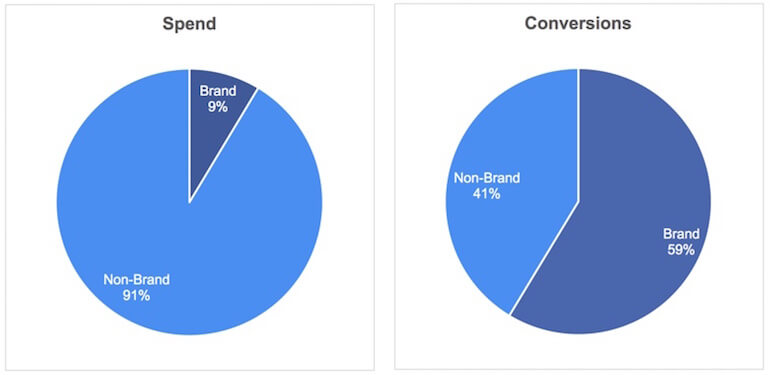
Competition for Brand
In one Google search, we can see that the Punctual Plumber has the exact same problem except they have three competitors between their paid ad and their organic listing. So, there is a good chance if they weren’t bidding on their own name, they might lose some clicks to their competitors. Keep in mind, if those competitors ads were the first ads, customers may choose one of these other companies. There are many searchers that do not differentiate between paid ads and organic listings.
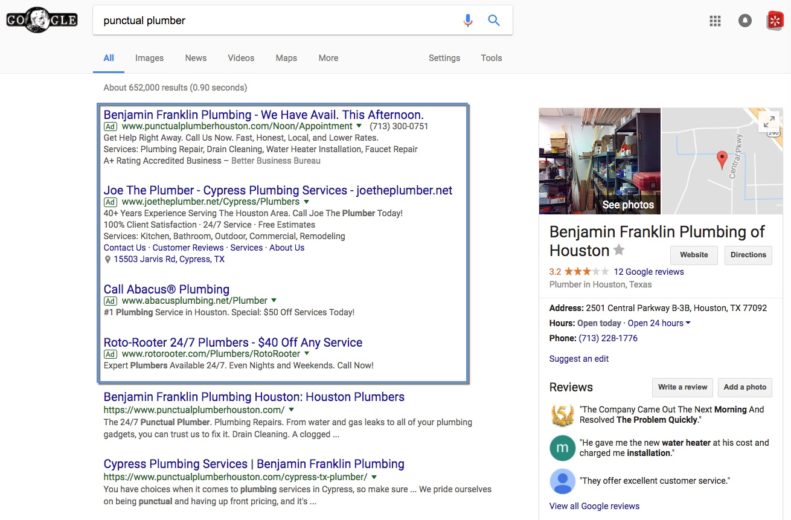
In another account, the total spend for Brand is only 3% of their total budget, and the conversions make up 19% of the total. This is a small amount of money to spend to guarantee you show up for your brand terms with the message of your choice.
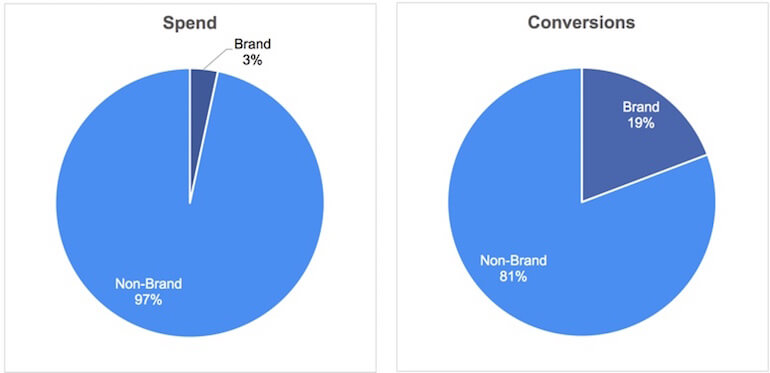
Control the Message
Another reason you might want to bid on your brand name is to control the message. Creating different ad copy for your brand campaign can allow you test different messages in your ad copy and measure performance. These tests may help you determine if you should consider updating your organic listing text.
In a search for Bed Bath & Beyond, we can see they include a CTA to promote their coupon program. In their ad, they also mention that they offer free shipping on returns which is not shown in their organic listing. Although they don’t have competition showing up in their brand search, they are taking full advantage of the extra real estate between their paid ad and organic listing. This also gives you an opportunity to test different site links messages like they are doing with their wedding registry and find a store near you.
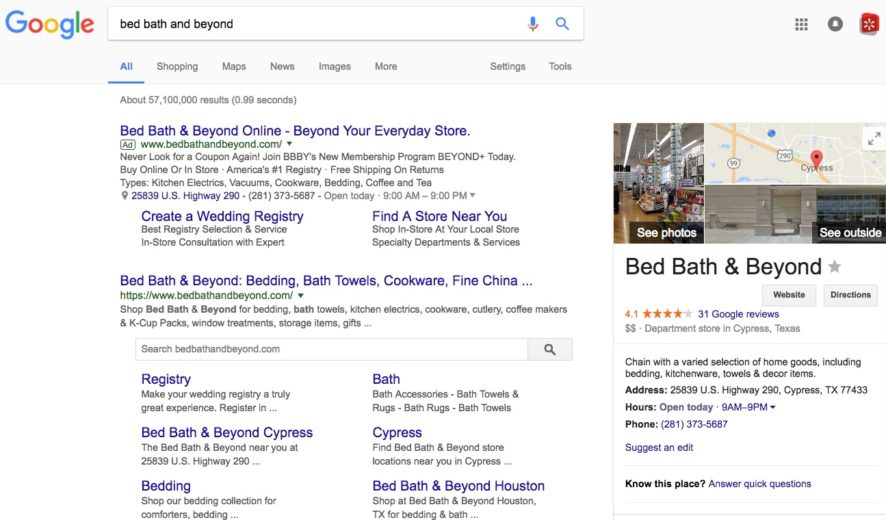
You can also use your paid ads to test different landing pages other than your homepage. For example, if someone was searching for Amazon Reviews, you can send them to a page that includes reviews. Or if they were searching for Amazon Complaints, you can send them to a customer service page so they have an easy way to learn how to address their concerns.
Brand Names Are Cheap
Bidding on competitor’s company names is oftentimes cheaper than some of your non-brand terms. However, this also goes for your company name as well. So if you are not bidding on your name, this gives your competitors an opportunity to get cheap clicks at your expense. Are any of your competitors forgetting to bid on their brand names? This may be an opportunity. Just keep in mind, once they figure out you are bidding on their name, they may return the favor (i.e. bidding war). At the very least, make sure you protect your own brand interests.
Are any of your competitors forgetting to bid on their brand names? This may be an opportunity. Just keep in mind, once they figure out you are bidding on their name, they may return the favor (i.e. bidding war).
If you decide to bid on your competitors brand names, just keep in mind, there are a few rules to follow. You are allowed to purchase their names as keywords, but you cannot use their name in your ad copy. Also, make sure you aren’t using Dynamic Keyword Insertion (DKI) in your headlines and create an infringement problem for yourself. Google does have an AdWords Trademark Policy to help protect you and others from trademark infringement.
Other Brand Benefits
One of our clients had little success in Bing. Or so we thought. Their Non-brand CPL would often exceed $1,000 and that was way above their goal. So for the past year, we only ran their Brand campaign along with a very small Non-brand budget. This network rarely had any revenue reported in Analytics. A couple of months ago, they set-up third-party call tracking we discovered that 82% of our Bing conversions were choosing to call for quotes. Without third-party tracking, we had zero insight into this call performance.
After listening to some really great calls generated from generic keywords, we boosted our non-brand spend. Suddenly, this client had two months in a row of making $70,000 from Bing paid. Analytics revealed that Brand was getting credit for 92% of all the revenue. This doesn’t even factor any additional revenue from the quotes they sent out for the Non-brand calls.

However, the only change we made was to boost our Non-brand spend. This does suggest that Non-brand may have lead to a lift in Brand revenue performance. Plus, once we factored the phone calls into performance our CPL dropped from $334 to $64 which was lower than Google’s average at $125. This is one reason why I recommended call recording in a previous article Reasons Why You Should Consider Call Recording.
Also, in Analytics, when comparing Bing organic and CPC paid revenue performance, we did see a slight drop in organic revenue performance, but the lift in paid performance was significant. The average organic revenue per month was $31,724, but after boosting Non-brand spend, we saw a lift in paid brand performance. In the last two months, they have averaged $86,870 in combined organic and paid revenue. It does look like October is pacing to see similar performance. In analyzing the Direct traffic, it did not appear that it affected that performance.

Brand Performance
According to an article from Search Engine Land, there are studies that show that paid ads convert better than organic listings. In fact, they say that the conversion rates can be 4x’s higher than organic. They show that having a paid ad alongside your organic listing lifted clicks by 32%.
Additionally, let’s say you decided to add additional budget into your Non-brand and Display campaign to build better brand awareness. You may want to monitor the performance of your brand campaign. Monitoring your brand conversions or impressions may help you determine if your efforts are impacting your brand awareness.
In another study by Bing, they reported an overall improvement in Brand click-through performance when paid ads were also present in the search results. Their study did suggest when you have paid ads in the results, they will get some of the traffic your organic listing used to get, but they also saw a 31% lift in performance.
In the client study mentioned above, my theory goes further than what Bing’s study reports. In the case of our client, we discovered that boosting Non-brand spend resulted in an increase in overall revenue performance between paid and organic. This suggests that our Non-brand ads may have been an assisting factor in the Bing brand revenue performance lift. As you can see below, our CPL’s were so high until we factored in phone calls in August and the increase in spending resulted in a lift in overall Bing revenue.

Closing Thoughts
In one of Google’s studies, they found that customers had a better brand recall when they ran a paid advertisement along with organic. This Google Brand Awareness study is a bit outdated from 2014, but I have no doubt that the benefits of bidding for brand outweigh the cons.
Hopefully, I have given you some additional insight about why you should consider bidding on your brand name. At the very least, maybe I helped confirm something you already knew. We would love to hear your thoughts about bidding on brand terms.



